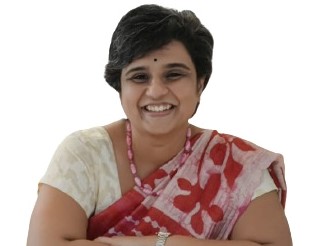This interview has been published by Priyanka Karwa and The SuperLawyer Team

Ma’am, we would like to know about your motivation to pursue law.
I have always loved working with words and with people. I also thought I was good at problem solving. I love books and felt that would help in a career where I imagined the ability to be comfortable with processing large volumes of text was a plus point. I felt the law would give me the forum to marry all the things I enjoy doing.
Was it your aim to become a gold medalist or it just happened?
I think that gold medal was scored in a course which was taught very well, and that I enjoyed. A good teacher can make the driest subject matter interesting and bring alive its human dimensions. Since my interest was kindled, I had fun studying the subject. Then the gold medal ‘just happened.’
Please elucidate about your experience of pursuing LLM from the University of Michigan Law School.
One of the best decisions of my life, I think. I chose Michigan for a few reasons.
One, I wanted the experience of living and studying in a small university town (Ann Arbor, in this case).
Two, the small class size appealed to me. In the LL.M class, we really got to know each other as a group of lawyers from all over the world of all ages, with varied experiences and backgrounds.
Three, the quality of the faculty and the brilliant mix of courses on offer.
I was looking to study both international law and commercial / corporate law, and I had the best of both experiences at Michigan Law. I took corporate law courses with Prof. Vikramaditya S Khanna, and also worked as a research assistant with him. I enjoyed the experience immensely and learnt a lot, including how to think about patterns and connections between law and business; as well as how to ideate projects and test hypotheses that need to be based on vast amounts of data.
On the public international law side, I attended a course taught by ICJ judge Bruno Simma, called Leading Cases in International Law.
I also did a handful of shorter courses for sheer joy. ‘Law and Popular Literature’ was a mini-seminar which met once a month over dinner at the home of Professor Gil Seinfeld. Given my love for books, and talking about them over good food and in congenial company, I thoroughly enjoyed this. (For book lovers, here are some of the titles we read: The Nine by Jeffrey Toobin, A Civil Action by Jonathan Harr, Scott Turow’s One-L, A Trial by Jury by Professor Graham Burnett, and In the Shadow of the Law, by Professor Kim Roosevelt). Similarly, the Uncensored History of International Law, taught by Dino Kritsiotis and the late Brian Simpson, was a fascinating course where we did a variety of readings that I remember to this day.
What did it take to get the opportunity to work as a Law Clerk at the International Criminal Court?
Serendipity. In 2004, the problem theme in the Philip C Jessup International Law Moot Court Competition was ‘The Case Concerning the International Criminal Court.’ My teammates and I spent close to six months researching and writing up our memorials, taking part in the India qualifying rounds and so on. We were the first team from NALSAR University of Law to make it to the World Finals in Washington DC, so by the time we were done, we knew quite a bit about the ICC. Hence it was quite natural to put in a convincing application for a clerkship. The time I spent in the Hague at the ICC was an incredible learning experience in a multi-cultural, multi-ethnic, multi-lingual environment. The professional bonds forged there were special.
How did you end up in the commercial area of law?
Commercial law can be very interesting. Everything depends on the lenses through which one views the world!
I have always had varied interests. I think it helps for a lawyer to have a broad vision of the world. After my ICC clerkship I had worked in the Capital Markets team at Amarchand Mangaldas, Mumbai (now CAM), before I went for my LL.M at Michigan. It was a whirlwind of a time since the capital markets were ‘booming’ in 2006-07 and everyone wanted to go public. It was a great learning experience for a young lawyer to be plunged from the get-go into the middle of hectic transactions and timelines. I learnt how to think on my feet, how to process information coming at me from all sides in different forms, and how to handle the variety of stakeholders involved in a public issue (promoters, C-suite folks, investment bankers, lawyers both Indian and foreign, auditors). At large all-party meetings or ‘drafting sessions,’ sometimes I would be the only woman at the table. I think the gender ratios are much better today.
Going public brings it with a great deal of excitement for companies and it was pleasant to be a very small part of that. As capital markets lawyers we would mark-up advertisements to ensure compliance with the law before issuer companies could plaster them on billboards. I remember how tickled I would feel that a piece of paper I had marked up with a red pen would be magnified 100 times over and splashed on hoardings I’d drive under on Marine Drive.
What qualities do you think an M&A Lawyer must possess?
No two M&A transactions are exactly alike, so I would say the skill to understand first principles thoroughly and then be able to apply them in any context is key. Knowing the basics is crucial to structuring deals in compliance with the law. For new and young lawyers, there is no substitute to reading the Indian Contract Act, the Companies Act, the FEMA and Regulations/Rules made thereunder end to end. Once that is done, understanding the documentation involved in an M&A transaction, why certain clauses are written the way they are written, what is the overall structure of the document, what is its internal logic and coherence, the commercial imperatives behind clauses – all these are very important. The best M&A lawyers understand not just the law and documentation but have excellent project and people management skills as well. Transaction management is both an art and a science and M&A lawyers must wear this hat too in an M&A deal.
Please tell us more about your experience in the sectors of fintech, e-commerce and IT.
At Samvad Partners, I work a lot with startups, corporates, and venture capital and private equity funds. I have been based in the Bangalore office since 2009, so we have been very much a part of the Indian startup growth story. We can only be effective advisors when we understand the business of the client and the counterparties deeply, as well as the regulatory and policy landscape. I think as a firm, we have come to develop expertise in these sectors (amongst others) as we always try to understand the business as well as the technologies of our clients and take a holistic approach.
IT is a very broad term – I think most of my work has a tech angle to it in some way or the other. A lot of the work I do for our VC/PE clients involves their investments in tech companies, so we really need to understand the business of the target company in order to do an effective due diligence. This can be very exciting since we have to keep pace with rapid changes in technology; the law can be slow to catch up. For example, we recently examined the business of a global company operating in the Web3 space, that wanted to issue tokens instead of shares. Data protection and privacy is another space that we see quite active at the moment.
On the fintech side, we have been advising companies on a variety of new business models, including in the space of decentralized finance. We help our fintech clients structure their businesses in a legally compliant manner; as they need to be mindful of increased regulatory oversight.
E-commerce continues to be an exciting space, as consumers we are thoroughly spoilt for choice! Our work here is similar to what we do for our other clients, helping them with compliance in different areas of law – foreign exchange management, company law, consumer protection, legal metrology, food safety and standards, and so on.
The last question to you is what advice you would give to our audience who are looking forward to work in The areas of e-commerce, IT law and M&A?
It is difficult to say do XYZ to become an expert in these fields. At the end of the day, basics have to be strong because you will need your basics of contract law and company law to stand you in good stead in all of these fields. The other foundation you will need for all these fields is an understanding of the foreign exchange management regime. After the basics comes learning through experience, and reading up on sector-specific law and delegated legislation. Delegated legislation can be a maze. A good practitioner has an understanding of the overall picture and how to navigate the maze.
Over time, I have found that one typically does one’s best work when one enjoys what one is doing. So, I’d say, take the time to figure out what area of law you enjoy. Use your internships well to get a sense of the different options available. The same thing needn’t work for everyone. If there is a particular area of work you enjoy, go all-out with it. Read and learn deeply, not just the law/regulation, but white papers put out by regulators and think tanks, similar activity in other jurisdictions – be creative, think laterally, connect the dots in ways that people may not yet have thought of. Use your creative energies to their utmost. Stay abreast with the trends. Don’t expect someone else to make you an expert in the field, take the responsibility to make yourself the expert. Start writing and putting your work out there. Connect with the people in the field you’re interested in, who are doing similar work. Breathe it and live it until you achieve it. (Then, just re-double your efforts! )
Get in touch with Neela Badami-

























